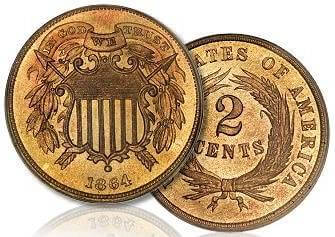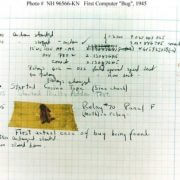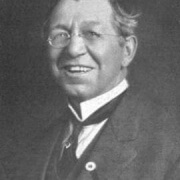April 22 is In God We Trust Day
 Today is In God We Trust Day. On April 22, 1864, Congress ordered the redesign of the one-cent piece and the minting of a new two-cent coin bearing the motto. On March 3, 1865, Congress passed another act directing the U.S. mint to place the words on all gold and silver coins.
Today is In God We Trust Day. On April 22, 1864, Congress ordered the redesign of the one-cent piece and the minting of a new two-cent coin bearing the motto. On March 3, 1865, Congress passed another act directing the U.S. mint to place the words on all gold and silver coins.
The phrase is often attributed to lawyer Francis Scott Key, who witnessed the British bombardment of Baltimore Harbor on September 13, 1814, during the War of 1812, which lasted much longer than its name suggests.
Key wrote the poem Defence of Fort M’Henry, which was later set to the tune of a popular British song, Anachreon in Heaven, and renamed The Star-Spangled Banner. In the fourth stanza, like many sports fans, Key expresses a belief that God is on our team’s side.
We include the poem in its entirety because, like us, you may not have seen it. We’ve never heard it at a sporting event. It would be cruel and unusual punishment for the fans and for the singer trying to hit the high notes again and again.
Defence of Fort M’Henry
O! say can you see, by the dawn’s early light,
What so proudly we hail’d at the twilight’s last gleaming,
Whose broad stripes and bright stars through the perilous fight,
O’er the ramparts we watch’d, were so gallantly streaming?
And the rockets’ red glare, the bombs bursting in air,
Gave proof through the night that our flag was still there —
O! say, does that star-spangled banner yet wave
O’er the land of the free, and the home of the brave?
On the shore, dimly seen through the mists of the deep,
Where the foe’s haughty host in dread silence reposes,
What is that which the breeze o’er the towering steep,
As it fitfully blows, half conceals, half discloses?
Now it catches the gleam of the morning’s first beam,
In full glory reflected now shines on the stream —
‘Tis the star-spangled banner, O! long may it wave
O’er the land of the free, and the home of the brave.
And where is that band who so vauntingly swore
That the havock of war and the battle’s confusion
A home and a country should leave us no more?
Their blood has wash’d out their foul foot-steps’ pollution,
No refuge could save the hireling and slave,
From the terror of flight or the gloom of the grave;
And the star-spangled banner in triumph doth wave
O’er the land of the free, and the home of the brave.
O! thus be it ever when freemen shall stand
Between their lov’d home, and the war’s desolation,
Blest with vict’ry and peace, may the heav’n-rescued land
Praise the power that hath made and preserv’d us a nation!
Then conquer we must, when our cause it is just,
And this be our motto — “In God is our trust!”
And the star-spangled banner in triumph shall wave
O’er the land of the free, and the home of the brave.
On July 30, 1956, President Dwight D. Eisenhower signed a law declaring that In God We Trust must appear on all currency. The first paper money bearing the phrase was issued the following year. He also made it the nation’s official motto, replacing E pluribus unum (Latin: Out of many, one), the country’s unofficial slogan since its inclusion on the Great Seal of the United States created in 1782.
Have a happy and healthy In God We Trust Day!









National “In God We Trust Day” isn’t weird, unless you don’t want to trust in God. Sounds like a great thing to keep in mind. Our world would be a lot more peaceful if we had trust in God.
This is an unusual holiday about a motto placed on coinage. “Worldwide Weird” in this site’s title is meant to call to mind “Worldwide Web,” not to cast aspersions on the holidays themselves. Historically speaking, belief in God has not brought peace to the world. I think “e pluribus unum” (out of many, one) is a better motto. We’re all in this together, no matter what God, if any, we choose to trust. But that’s outside the scope of our little holiday site. Thanks for writing!